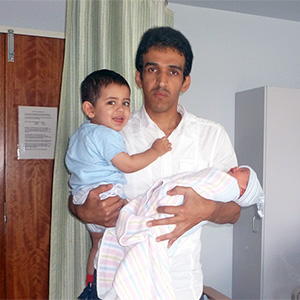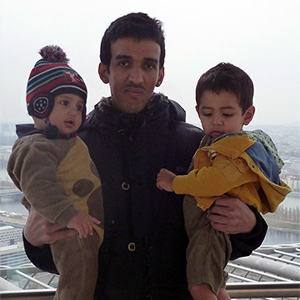Musaed Alharbi
On loss and hope
Losing a child is devastating for any parent. But the heartbreak of losing two children within six months, far from your family and support network, is incomprehensible. Ten years ago, when they moved to Australia from Saudi Arabia to study at UNE, Musaed Alharbi and his wife Badriah could not have imagined the devastating turn their lives would take. Theirs is a story of great sadness, but also of hope.
Here, Musaed shares it for the first time.
 Musaed Alharbi with his children, Bassam and Hatem, the day after Hatem was born in Armidale Hospital.
Musaed Alharbi with his children, Bassam and Hatem, the day after Hatem was born in Armidale Hospital.
“I was brought up in a family that patiently confronted every problem it faced and believed in the virtue of volunteer work. My late father taught me that sacrifice is a catalyst for abundant gains. The example of my mother, who cared for an elderly woman in our home for 20 years, inspired me greatly while caring for our beautiful sons during their years of illness.
Our first son, Bassam, was born in Saudi Arabia on 13 May 2010 and was five months old when we moved to Australia. Hatem was born in Australia on 20 January 2012. He, too, seemed healthy.
But even before Hatem arrived, Bassam had shown signs that something was wrong. Within months he had developed rapid eye movements and, subsequently, began to lose his gross motor skills. He would remain undiagnosed until June 2013, when we discovered that Hatem had the same condition.
During the early stages of the disease, we drove Bassam from Armidale to Sydney every month for treatment. Badriah decided to pause her studies (a Masters in History) to dedicate herself to caring for the boys. I was in the first year of my Masters program, and resolved to continue my studies.
Of course, I found it difficult to manage my study and family responsibilities. I could only do so by withdrawing from my social life and working harder than normal.
 Musaed, Bassam and Hatem in Vienna when they trying to treat Bassam in Europe.
Musaed, Bassam and Hatem in Vienna when they trying to treat Bassam in Europe.
By the time of my annual holiday, in October 2012, I was under considerable stress. For four months I travelled to Saudi Arabia and Europe to seek a diagnosis and treatment for Bassam. We tried our best to understand how to help him. But the travel and treatment costs soon exceeded our $40,000 budget and his condition was not improving. Worse still, in February 2013 Hatem started showing the same symptoms. Hatem’s illness came as a huge shock to me and my wife. We felt hopeless and shattered.
Despite the challenges, I decided we should return to Australia, where the health care for the boys would be better. I believed things would improve if I could formulate a financial plan for the next few years. I would then just keep moving forward, one step at a time. My wife and I would take on around-the-clock care of our boys and do everything possible to make their lives joyful.
We returned to Australia in March 2013 and left no stone unturned to find out how we could enhance Bassam’s life. We dealt with many adversities that year. In June, the boys were both diagnosed with a progressive neurodegenerative disease. At the Sydney Children’s Hospital, we learnt that children with this rare condition usually only live for 5-10 years.
Over the next 12 months the boys gradually lost their ability to function normally. After that, they deteriorated over a period of eight years. Although the boys were long-term patients under the supervision of local healthcare teams during this time, we were right by their side, caring for them at home 24 hours a day, seven days a week.
Every day I would wake at 5 o’clock, have my breakfast and then it would take three or four hours just to bath and prepare the boys for the new day. After that I would do my exercises for half an hour and then start my study. This was my life, but their gentle nature and interest in the world around them made any sacrifices worthwhile.
The essential healthcare we provided at home included many procedures normally carried out by healthcare practitioners. The list included urinary catheterisation, manual evacuation, gastrostomy feeding, oropharyngeal and nasopharyngeal suctioning, complex seizure management, pressure area care and positioning, and oxygen level and heart rate monitoring. We also operated critical medical equipment (like oxygen concentrators) and administered emergency drugs.
During the monthly trips to Sydney, we needed to carry all their daily equipment, such as wheelchairs, seating chairs, bath seats, feeding pumps, suctioning machines and medical supplies. We carried three portable oxygen cylinders and two oxygen concentrators for use along the way. Our Kia Carnival looked more like a mobile intensive care unit.
In 2015, Badriah decided to resume her studies, while I was preparing for the defence of my PhD proposal. In addition to the psychological and physical difficulties we faced, we were also in financial difficulty because of the high cost of healthcare and medical equipment, which ran into hundreds of thousands of dollars.
On 13 January 2017 we were blessed with the arrival of our exquisite daughter, Refan. But her time with her brothers was to be short. Almost three years later, Hatem passed away, on 28 September 2019. His older brother Bassam passed away on 24 March 2020, while Badriah and Refan were visiting family in Saudi Arabia. They were then unable to return to Australia for nine months, due to COVID-19 travel restrictions, compounding my grief. Bassam and Hatem were buried beside each other in Armidale Cemetery.
I remember feeling considerable anxiety, self-doubt and guilt as I tried to maintain my studies during this tumultuous time. I vacillated between the need to care for my family and the need to keep up with my studies. I could not work, as Badriah and I are both on student visas. I nonetheless completed my Masters degree in 2014, and Badriah completed hers in 2017. I obtained my PhD in 2020 and the examiners commended my doctoral thesis for its outstanding research.
I am now doing an additional course at UNE in data science, specifically in the field of health data, and expect to graduate in November. [Musaed worked in the Saudi Arabian Ministry of Health as a statistician for eight years before moving to Australia.] I have published several articles, and I am actively conducting research. I want to change our lives for the better.
I still miss the boys and visit the cemetery four times a week. I don’t know how to get back to my normal life, but I will do my best. Refan will be five in January. She is a very active and beautiful girl.
Sometimes life is very tough, but I have learned many important lessons during the past decade, through my studies and our sons’ short lives. People with kind and generous hearts can be uplifting to even the sickest kids, and the psychological support provided for families with a sick child is invaluable. We have lovely health care workers here and in Sydney who continue to keep in contact with us. I cannot thank those people enough.
After our boys passed away, we donated their specialised equipment, worth about $70,000, to the Armidale Hospital. Regional hospitals can lack a lot of medical equipment for inpatients and I am happy it can now be used to help disabled children admitted to the hospital.
We also intend to now support the families, hospitals and non-profit organisations that support sick kids and hope our story encourages others in the community to support these charities. Badriah and I owe an enormous debt of gratitude to the many medical teams who helped our special boys, and to Bear Cottage, Little Wings, the Starlight Children's Foundation and UNE as well.
Owing to the burdens of these past 10 years, I have been unable to share the story of our beloved sons, Bassam and Hatem. I am sharing it now, as an expression of the gratitude and respect Badriah and I feel for UNE and the educational opportunities we have received. I am so proud and happy to study at UNE.”

